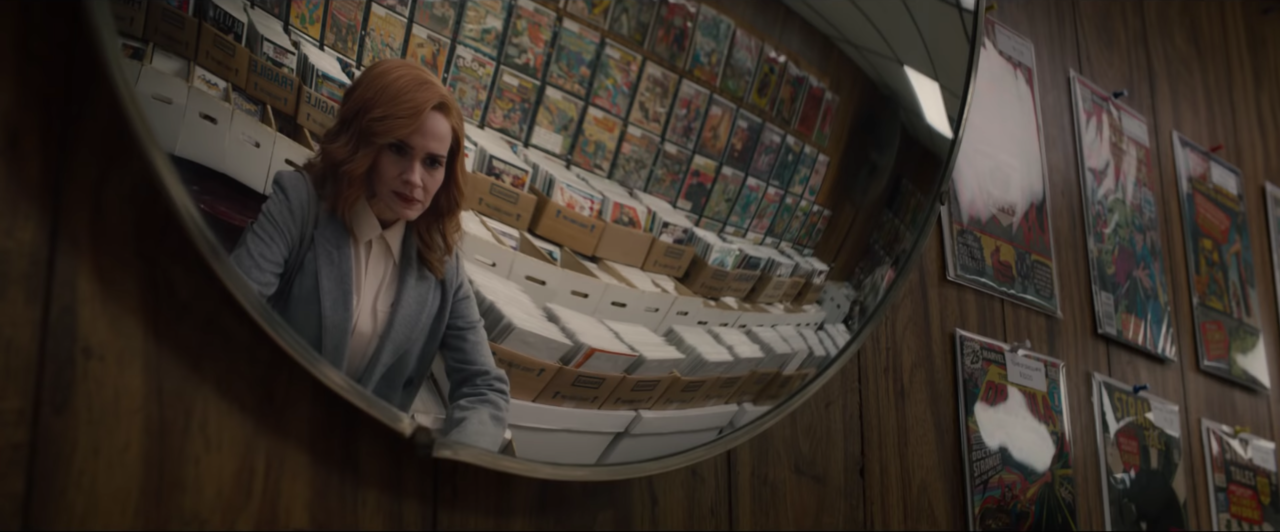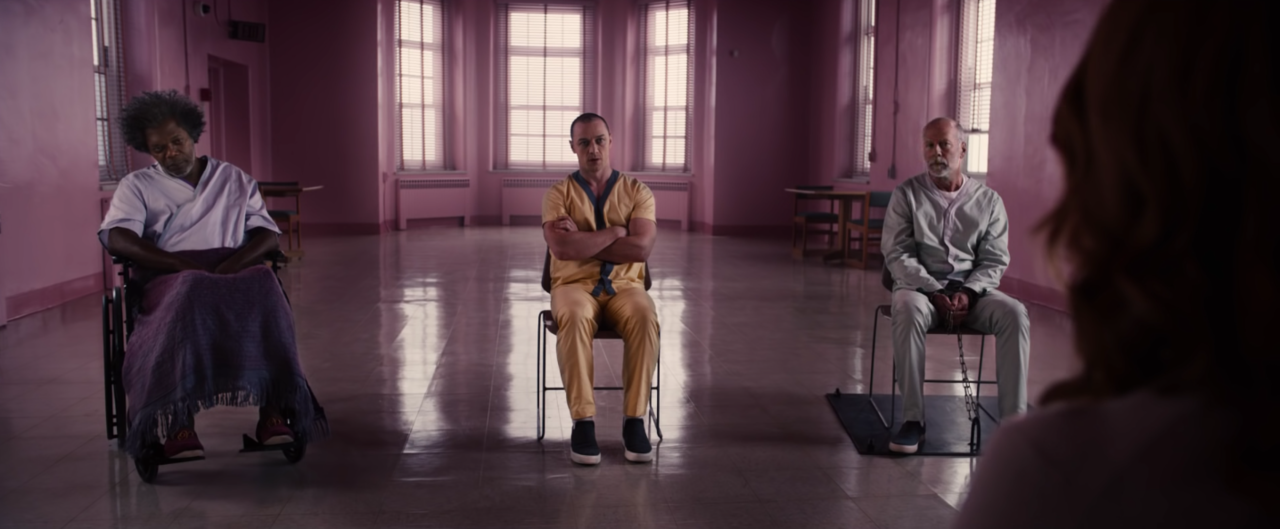In the year 2000, when M. Night Shyamalan's Unbreakable hit theaters, comic book movies were barely a thing. Unbreakable was the young director's follow-up to the sensational Sixth Sense, and going in, it wasn't clear what the movie was. That it turned out to be a low key superhero movie with a villain obsessed with comic books made it, in retrospect, way ahead of its time. Glass has the opposite problem: It's overtly a comic book movie, but one for people who have never read a comic book. It feels hopelessly behind the times.
Glass is the follow-up to 2016's Split, itself a surprise Unbreakable sequel, which wasn't revealed until the extremely meta signature Shyamalan twist of Bruce Willis appearing in the movie's final scene. Two decades ago, Unbreakable followed Willis's David Dunn as he slowly discovered his own incredible strength and invulnerability, with plenty of encouragement from Samuel L. Jackson's fragile but maniacally intelligent Elijah Price, AKA Mr. Glass. Split introduced a third super-powered individual, James McAvoy's Kevin Wendell Crumb, or "The Horde," a collection of split personalities who actually change the character's physical state and abilities as they vie for control of his body.
Glass brings the whole thing together: After an exciting opening act of Dunn, who the internet has dubbed "The Overseer," hunting The Horde before he kills more girls, all three main characters wind up in a very comic booky asylum. They're overseen by Sarah Paulson's new character, Dr. Ellie Staple, who's designed special cells with the two newcomers in mind: David's can fill with water, which renders him weak, and Kevin's is equipped with bright strobe lights that force a personality change. Elijah, on the other hand, has been there for some time, heavily sedated 24/7. The setting makes for some wonderful tension throughout the movie, and it feels appropriately oppressive.
But that's basically it. Almost the entire runtime is spent at this single location, as Dr. Staple works to convince all three that their powers are the imagined results of childhood traumas and frontal lobe injuries. This drama is well-acted (especially by McAvoy, who once again plays about a dozen distinct characters) and often deftly written, but it drags on way too long. Somewhere in the middle, you're liable to experience a sinking feeling that this is going to be the whole movie, and you're right.
Besides that, there's another problem with this structure: As the audience, we've seen the evidence. We don't need convincing. We know that Shyamalan isn't about to undo two movies' worth of build-up, so we wind up waiting most of Glass for the other shoe to drop. And when it finally does, it's wildly anti-climactic, as the audience falls victim to one of Mr. Glass's misdirects: The movie very deliberately leads us to believe the final showdown is going to be much more exciting than it actually is. What a twist?
Glass is weirdly self-conscious about being a superhero movie inspired by comic books. The three main characters' bit players come along with them, including Dunn's son Joseph (Spencer Treat Clark, the same actor from Unbreakable), Elijah's mother (Charlayne Woodard, also from Unbreakable), and Split's Casey (Anya Taylor-Joy), who originally bonded with some of The Horde's personalities while being held hostage by others. They spend their time in the B-plot "discovering" things about comic books that everybody already knows. Each page they turn corresponds with some non-revelation about the bare bones basic structure of comic book stories, like the fact that a character's parents are usually important to their origin story. We honestly didn't need multiple scenes of wide-eyed page-flipping to figure that out, but we got it nonetheless.

Shyamalan takes some liberties with comic book culture in general, particularly in the script, which sometimes verges on terrible. "Have you ever been to a comics convention?" an exasperated Dr. Staple asks the assembled side characters as she attempts to convince them they're all delusional. One especially irksome quirk has multiple characters, but especially Mr. Glass, constantly explaining the structure of events as they unfold, just in case the audience forgets for one second that this is playing out like a very basic comic book. "This is the part where they would draw you looking surprised," or "Now the main characters have assembled!"
It's grating, and it feels like Shyamalan understands comic books only on a theoretical level, grasping their basic structures and what makes them appealing, but having never actually read any himself. He has characters refer multiple times to "limited edition comic books, where the hero and the villain have a showdown," which makes no sense on multiple levels. His staged comic book shop has two sections in the back labeled "Heroes" and "Villains," and if you don't realize what an organizational nightmare that would be, well, maybe the rest of this won't bother you either.

But even if that's the case, Glass isn't the movie it should have been. There are hints of it early on, before the film takes a left turn and spends the rest of its stay focusing on all the wrong things. Like most of Shyamalan's movies, Glass is well directed and scored, and there are moments of brilliance and tension throughout. But when the twist is literally that the climax won't actually be as exciting as you've been led to believe, it's impossible not to feel disappointed.
| The Good | The Bad |
|---|---|
| Solid performances, especially McAvoy | Some terrible dialogue |
| Fun to follow up with these characters after so much time | Dragging pace |
| Plenty of tension | Deliberately anti-climactic twist |
| Feels outdated | |
| A comic book movie for people who don't read comic books |
